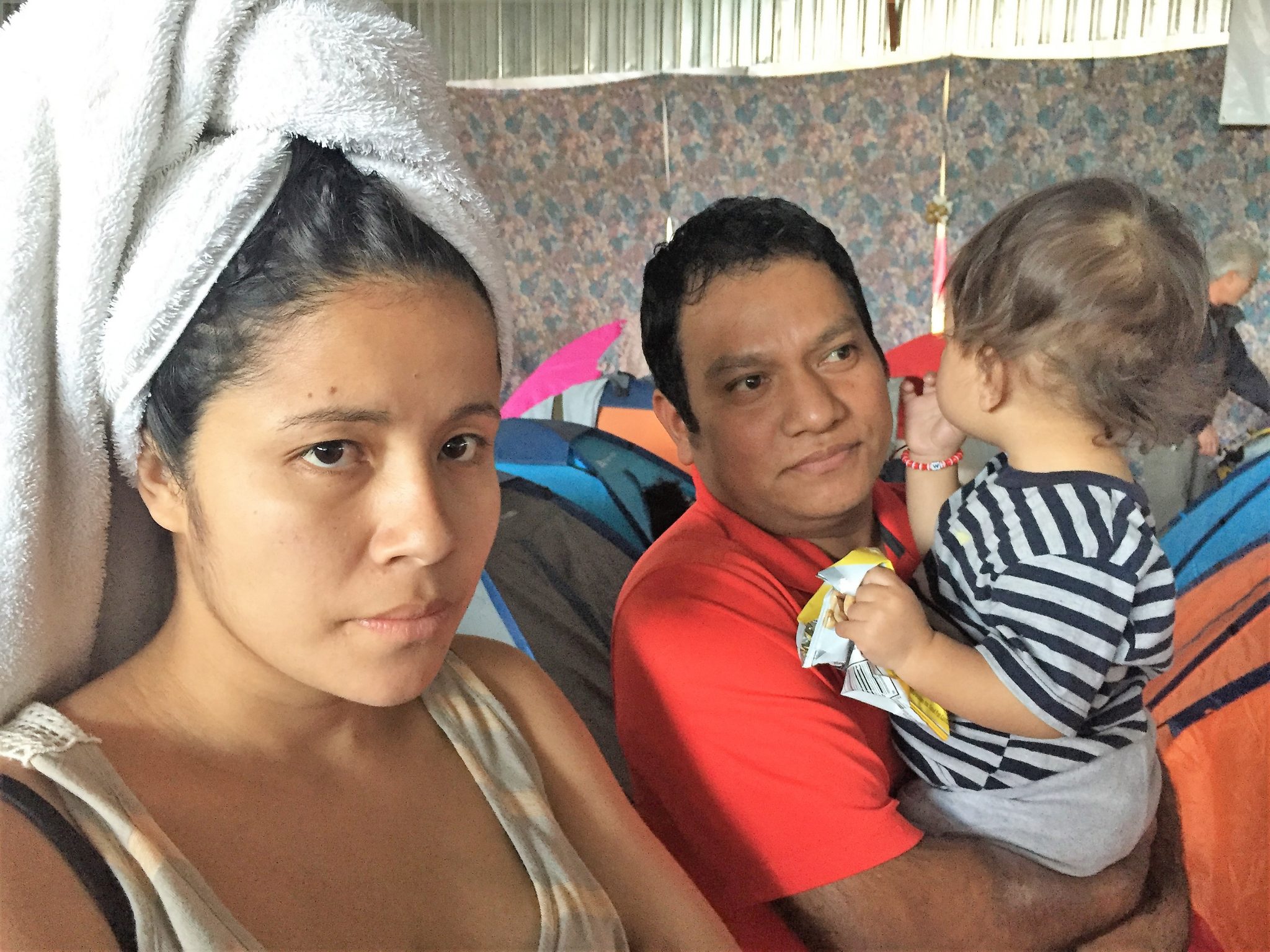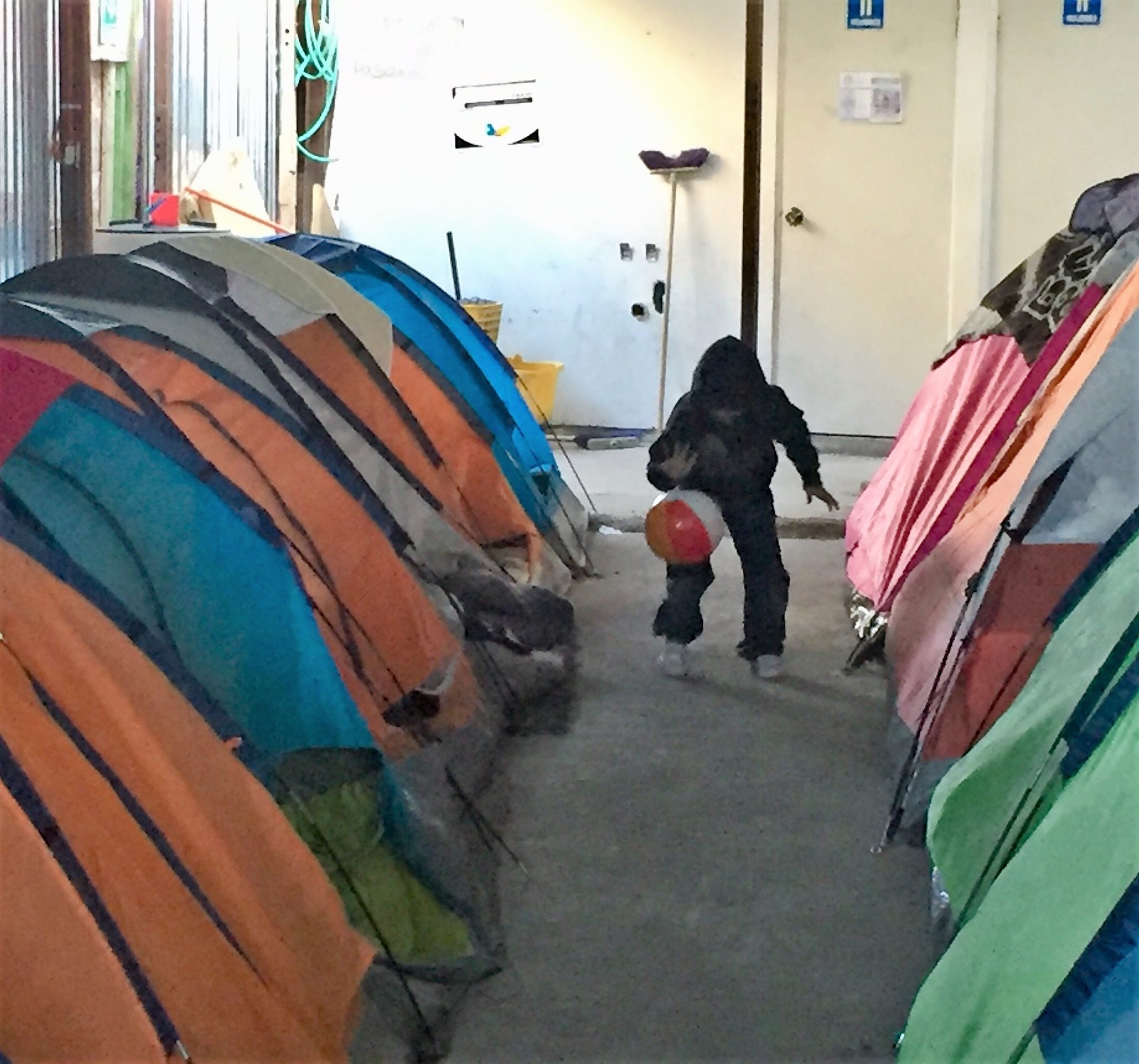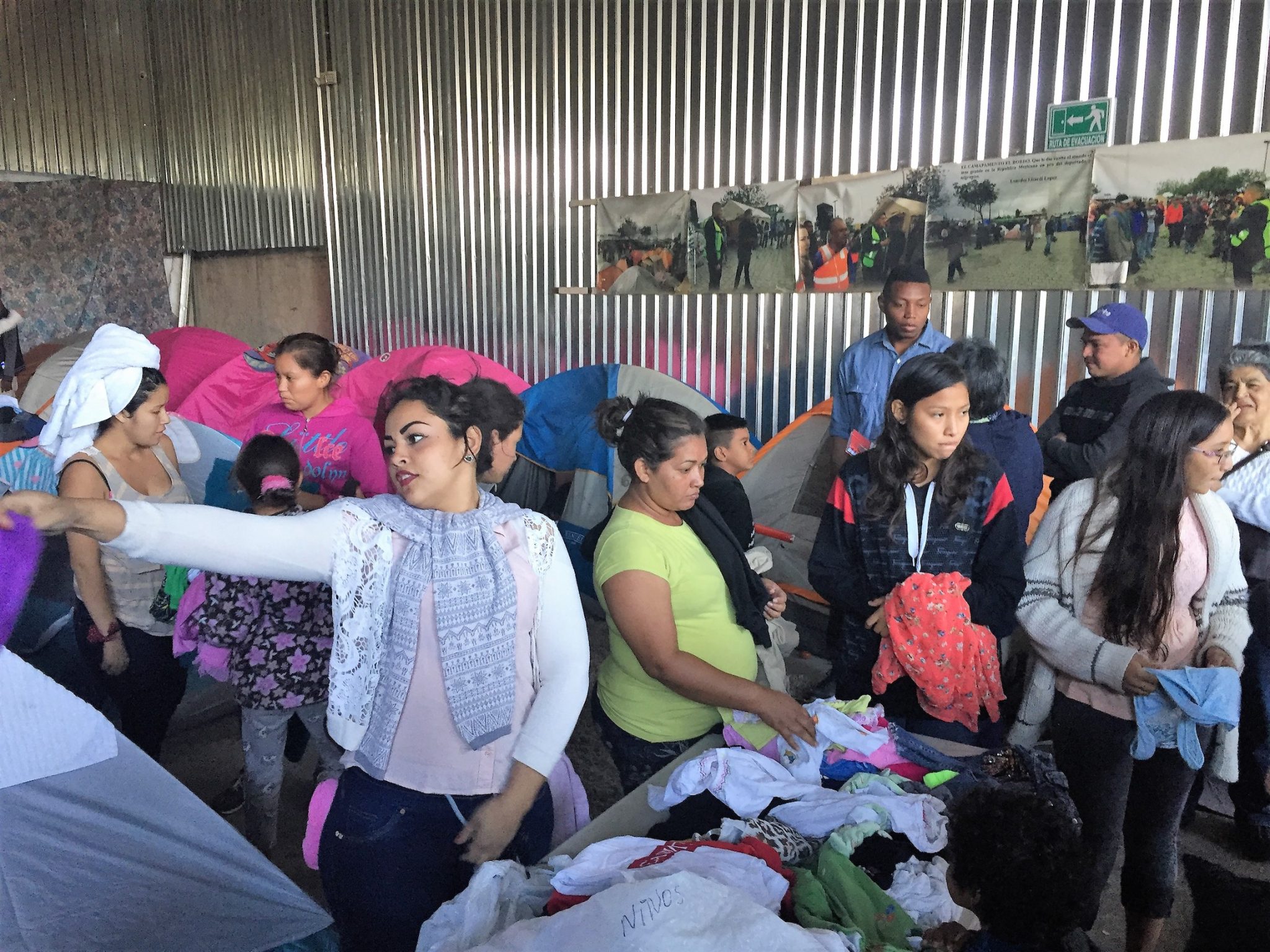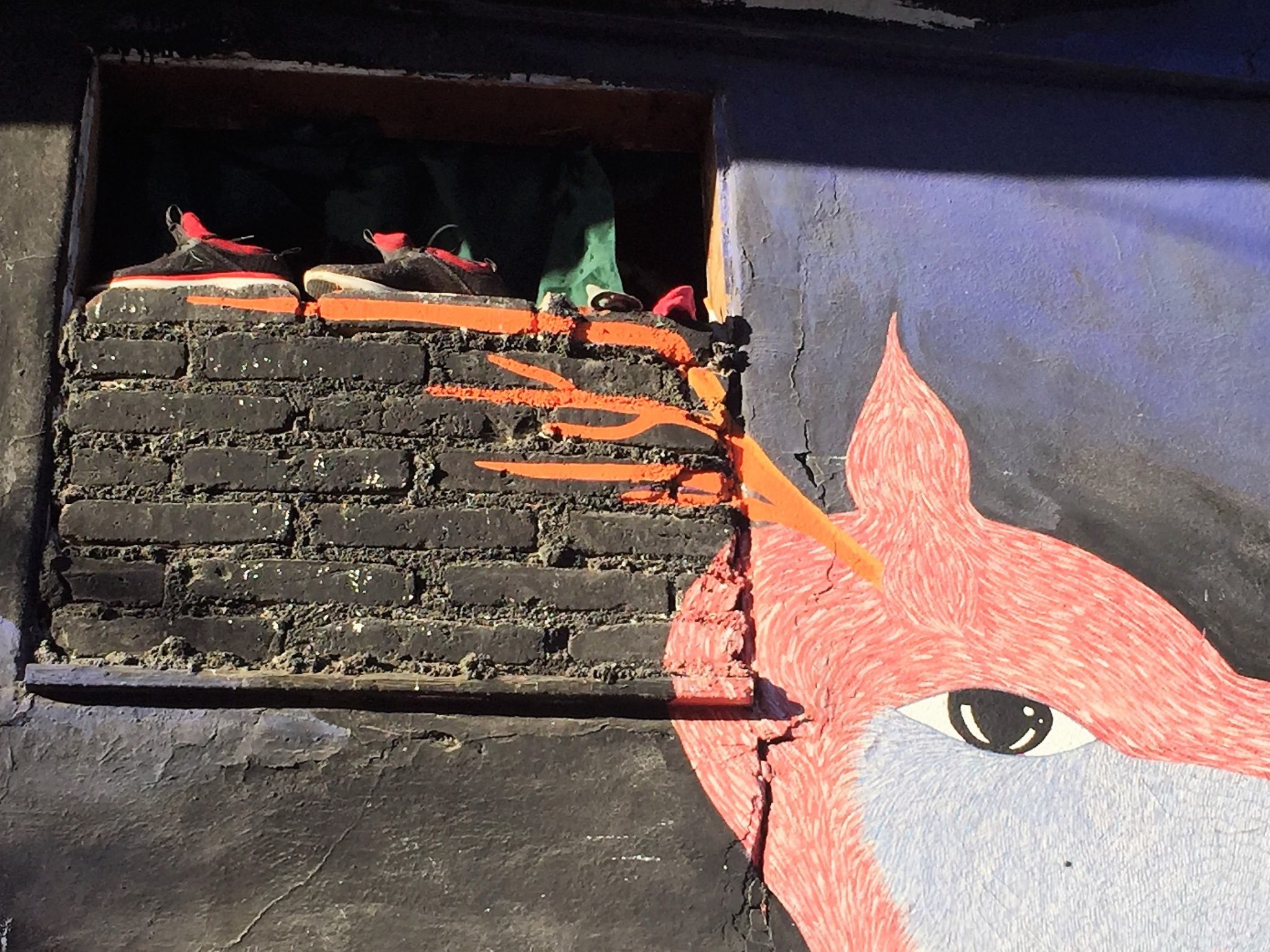

Carla and Santos (Photo by Pilar Marrero)
TIJUANA, MEXICO — Carla, a five-months pregnant young Guatemalan woman, just got out of the shower and has a towel around her hair. Her husband Santos walks around placidly holding their one-year-old son, who is eating some potato chips out of a bag.
The family looks like they could be in their own living room, but their “home” is a brightly colored tent inside the Movimiento Juventud 2000 migrant shelter in Tijuana, where at least 30 other families are currently staying.
“We have been here for about three months”, Carla says. “We came with the caravan.”
The tents are set in rows and columns very close together. A little boy runs between them, bouncing a ball, playing by himself.


A boy playing with a ball at Movimiento Juventud 2000 (Photo by Pilar Marrero)
Two dozen women gather around a table. On the table is a mountain of blankets and toiletries donated by a group that came from Los Angeles with City Councilman Gil Cedillo earlier this week.
Most of these families are waiting for their “number” to apply for asylum at the U.S. border, which is technically just a block away. The nearest crossing is in El Chaparral, less than a mile from the shelter. Starting this Friday, the Trump administration intends to have asylum seekers wait in Mexico for prolonged periods of time, although implementation of this new policy is still unclear.


Women at the Juventud 2000 shelter pick from some donations that arrived on Monday. (Photo by Pilar Marrero)
Santos, with his toddler in tow, explained that the couple lived in El Salvador, where he is originally from, and decided to join the caravan because of the pressure of the local gangs.
The couple had a small business selling shoes, and gang members demanded the payment of monthly “rent” in exchange for allowing them to live in relative peace.
“If you have your things, like a tv set, they ask for it. First, they do it nicely. Then, they tell you to pay rent. Then if you don’t, they threaten to kill you,” Santos said.
The couple is aware that a few hundred other potential asylum-seekers have gone back to their countries after the caravan arrived in Tijuana, discouraged by the wait and the difficult conditions.
“Yes, the trip is dangerous, and the wait is hard, but we must save our lives,” Santos explained. “It’s much more dangerous to sit over there waiting to be harmed by the gangs.”
After three months of waiting, do they still have hope? Have they heard that getting asylum is much more difficult under the Trump Administration and that other families have been separated?
“Yes, but we see no other option. Let’s see what God says, in the end, it’s all in the will of God,” Santos said.
Trapped in Tijuana
Faith in God or “some kind of miracle” seems to be a oft-repeated argument for migrants in desperate situations of danger or poverty who continue to leave Central America, despite all the attempts at deterrence that have been put in place by the Trump Administration and the Obama Administration before that.
A new caravan with around 2,000 people left Honduras on January 15 and a smaller one of 200 started out from a plaza in San Salvador on the same day.
The fact that more than a couple of thousand individuals from the previous caravan are still stuck in Tijuana waiting to apply for asylum, or the high-profile harsh treatment that they received on arrival, doesn’t seem to be discouraging the new group, according to Oscar Chacón, executive director of Alianza America, a U.S.-based network of immigrant advocacy organizations.
“In Central America, there is enough coverage of the fact that these people that left in October are trapped in Tijuana and that hundreds of those who left returned frustrated to their countries,” Chacón said. “No one is being deceived, no matter what some people in the US seem to believe.”
Since the flows of unaccompanied minors and families from these countries started increasing in 2014, the policy of the U.S. embassy has been to promote information about the dangers of the trip and to try to discourage them.
Chacón said that traveling in caravans, alone or with “coyotes,” will not stop, if people feel their situations continue to be desperate. Religion plays an important role in their logic.
“When a family falls into that level of despair, people place their blind faith in the idea that something will happen by the grace of God and they will reach the U.S.A.,” he noted. “If you try to reason with them, they still believe ‘something miraculous’ is going to happen. As long as the conditions in those countries don’t change, they’ll keep coming.”


In this Tijuana shelter for men, sneakers are placed on the holes that pass as windows to air them out. (Photo by Pilar Marrero)
“Hopefully, God Will Help”
Back in downtown Tijuana, 18-year-old Antonio Márquez is waiting for a haircut at the Desayunador Salesiano “Padre Chava,” a community grassroots organization where 1,200 migrants get breakfast every morning and other assorted services from volunteers, including medical checkups.
Márquez is from La Ceiba, Honduras, and said he left his country because he “wanted a better life.”
“I left and didn’t tell my family where I was going,” he explained, with a shy smile. “I will try to go to the other side. Hopefully, God will help…”
Father Agustín Novoa, the Salesian priest who heads the organization said that “radical poverty and violence” in the Northern Triangle of Central America push many young people and families to seek options elsewhere.
His organization served about 900 breakfast per day, mostly to deportees, homeless and some migrants before November, but after that date, with more than 6,000 arriving in Tijuana with the caravan, the need has increased.
Mexican authorities reported that last week, about 3,500 people crossed legally from Guatemala into México. They include 2517 Hondurans, 184 Guatemalan and 302 Salvadorans. That doesn’t include the ones who cross undetected. Some of this may be part of the “new caravan” or just regular migration flows.
Jorge, a 22-year-old Honduran national currently living in Tijuana’s Hotel Migrante, goes to the “garita” (border checkpoint) every other day to check on the number being currently served for asylum seekers.
“They’re now calling the number 1724,” Jorge said. “I have 1890. When my number comes, I can come in and apply for asylum.”
For the last several months, the Trump administration has limited the number of asylum seekers allowed to enter the U.S. each day to about 40. The number gets assigned by an unofficial committee that writes names in a notebook and both Mexican and U.S. governments seem to abide by it, in spite of the informality (and illegality) of it all.
Jorge recounted that he has a friend in Washington D.C., whom he hopes to join once his number comes up and he is able to get into the United States to request asylum.
“I know that as soon as they arrest me, I will be sent to the ICE box [hielera], the ice-cold holding cells where migrants are held for days once in Border Patrol custody,” he noted. “Everyone knows that”.
Still, Jorge waits eagerly for that moment.
“In Honduras, you never know when they’ll come for you to kill you because you don’t want to join the gang,” he said. “I prefer this, at least, there’s always some hope.”
***
Pilar Marrero is a journalist and author living in Los Angeles, California. She produces and co-hosts The Pundettes, a political podcast. She tweets from @PilarMarrero.


